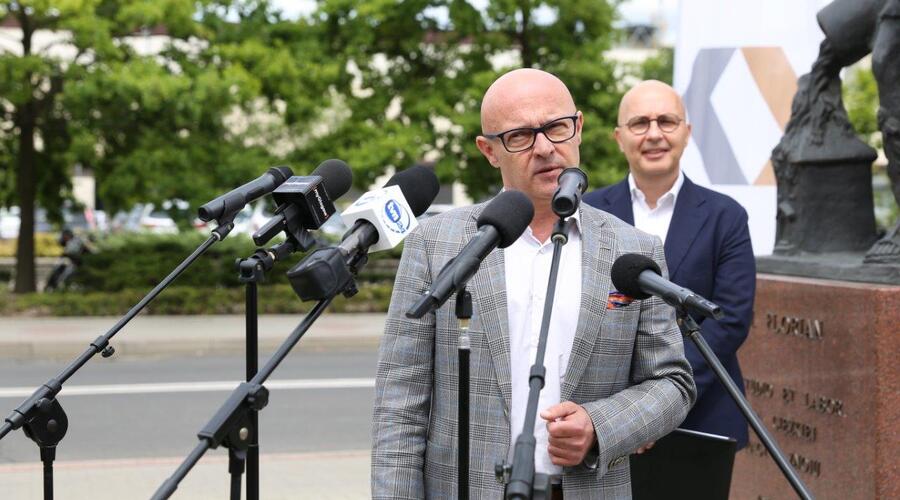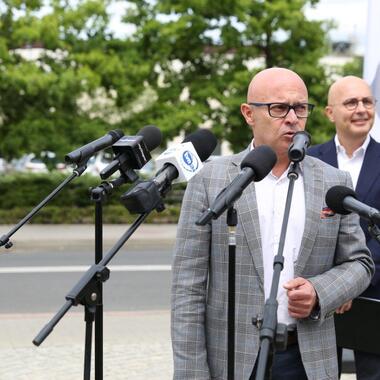Investment plans of KGHM Polska Miedź S.A. – summary of the press briefing
On 4 July, a press briefing was held at the Głogów Copper Smelter and Refinery, attended by Andrzej Szydło, President of the Management Board of KGHM Polska Miedź S.A., and Robert Kropiwnicki, Secretary of State at the Ministry of State Assets. The meeting focused on the Company's investment plans and the so-called copper tax.
KGHM Polska Miedź S.A. is constructing three new shafts in the Copper Basin, which will ensure stable conditions for copper mining, processing and smelting. Copper is a critical raw material that plays an increasingly important role not only in business, but also as a guarantee of public safety and security in Poland and Europe. During the meeting, the President of the Management Board of KGHM admitted that it was difficult to discuss long-term plans without securing long-term financing and production profitability.
‘KGHM has some of the deepest mines in the world and specific deposits that extend over a very large area. We do not have in Poland any opencast mines or deposits that are easy to exploit. Our deposits are located further and further away and deeper and deeper. If we add to this the mineral extraction tax introduced in 2012, the question arises as to whether, at this stage, after 64 years of mining, KGHM can afford to invest in mining. Minister Robert Kropiwnicki contributed to opening the door for us to talk to the Ministry of Finance about the mineral extraction tax. Without this dialogue, it would be difficult to understand the problem we are facing and to build our long-term strategy,' said Andrzej Szydło, President of the Management Board.
The new shafts will ensure an adequate stream of concentrate in the long term and at least maintain production levels over the next 15 years, allowing full utilisation of the production capacity of the Main Processing Line, including the KGHM smelters.
‘We are talking about KGHM’s investments, and we are meeting at the Głogów Copper Smelter and Refinery. This may seem surprising, as the investments we are currently planning mainly concern mining. We have recently decided to commence the preliminary construction phase of three shafts. The Głogów Copper Smelter and Refinery was built between 2012 and 2016, a period when KGHM was in very good shape. Now it is more difficult to secure feedstock for smelters, which are very specific and adapted to the concentrates extracted from KGHM's mines,' explained Andrzej Szydło, President of the Management Board of KGHM Polska Miedź S.A. ‘Last year, we began discussing KGHM's long-term vision. We identified all the elements and production capacities of KGHM's entire technological chain. It is complete: from mining, through enrichment, smelting and processing. Due to the fact that KGHM's smelting facilities are modern and their processing capacity – including Europe's largest copper smelter and refinery in Głogów – is so large that it is absolutely necessary to ensure their full utilisation, preferably based on KGHM concentrates, for which these smelters are designed and adapted,’ concluded the President of the Management Board.
Robert Kropiwnicki, Secretary of State at the Ministry of State Assets, began the conference by congratulating the decision to build three new shafts, emphasising that this is something that KGHM, its employees and the entire region greatly need.
By 1990, 30 shafts had been built. Then, only one shaft, GG-1, was built, and now we are finally building three new shafts. This shows how much still needs to be done to provide miners with better conditions and to make mining cheaper and more efficient.
As emphasised by the Deputy Minister, the development decision is crucial for the functioning of KGHM, but also for the entire region. Thanks to this, KGHM has the prospect to operate until 2060, which means it is entering a period of development. At the same time, he thanked the Ministry of Finance for its declaration of changes to the copper tax law and for keeping its word:
‘The draft law is ready, and inter-ministerial and public consultations are beginning. In September, the draft will be debated in the Sejm so that the copper tax can be reduced from 2026. KGHM's calculation of the profitability of the deposits was also based on this relief. The gradual reduction of the tax is a very good and fair arrangement, which enables KGHM to develop, but also secures state budget revenues,' concluded the Secretary of State in the Ministry of State Assets.
The decision of the KGHM Management Board to construct new shafts is a prospect for the development of the entire Copper Basin – the investment projects will have a positive impact on the local market and create new jobs through the involvement of KGHM Group companies and external contractors.
‘The development will also affect a significant part of the KGHM Group, and if we are talking about multi-billion investments in the future, our specialist company, PeBeKa, will play an active role. It should also be appreciated that within the Group we have companies such as KGHM ZANAM, Energetyka and Metraco, which will actively contribute to the development of KGHM in the future,' said Piotr Stryczek, Vice-President of the Management Board of KGHM Polska Miedź S.A. for Corporate Affairs.
Description of proposed amendments to the Act on Tax on the Extraction of Certain Minerals
The proposed amendments to the tax on the extraction of certain minerals aim to create a favourable environment for the further development of the copper mining industry in Poland. It is also important to establish a mechanism from 2029 onwards that will allow eligible taxpayers to deduct part of their investment expenditure from their tax liability. The changes are intended to stimulate the dynamic development of the copper mining industry in Poland, the construction of mines and, consequently, the creation of new jobs. We assume that these favourable changes in the taxation of copper mining will contribute to the development of the region and result in higher revenues for the state budget in the future due to the development of mining activities through investments and the extraction of raw materials.
Source:






